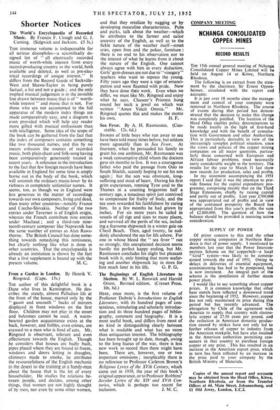Shorter Notices
The World's Encyclopaedia of Recorded Music. By Francis F. Clough and G. J. Cuming. (Sidgwick and Jackson. £5 5s.) Tins immense volume is indispensable for all serious discophiles—a scientifically de- signed list of " all electrically recorded music of worth-while interest from every record-producing country in the world, both available and deleted, as well as pre-elec- trical recordings of unique interest." It differs from the Record Guide of Sackville- West and Shawe-Taylor in being purely factual, a list and not a guide ; and the only implied musical judgement is in the invisible line drawn between music that is of " worth- while interest " and music that is not. For those who are not accustomed to the full apparatus of the modern index things are made comparatively easy, and a diagram is even provided which will help any reader more gifted With musical enthusiasm than with intelligence. Some idea of the scope of the book can be gathered from the fact that the index of composers contains something like two thousand names, and this by no means exhausts the sources of recorded music, both plain chant and folk-song having been comparatively generously treated in recent years. A reference in the introduction to the fact that few foreign records have been available in England for some time is amply borne out in the body of the book, which will astonish the ordinary music-lover by its richness in completely unfamiliar names. It seems, too, as though, we in England were less generous in the matter of recordings towards our own composers, living and dead, than many other countries—notably France and Czecho-Slovakia. Neither of the two entries under Taverner is of English origin, whereas the French contribute nine entries under Machaut ; and a third-rate nine- teenth-century composer like Napravnik has the same number of entries as Alan Raws- thorne. The British Council has done some- thing towards remedying this remissness, but clearly nothing like what is done in other countries. That the encyclopaedia is already an institution is shown by the fact that a first supplement is bound up with the


































 Previous page
Previous page